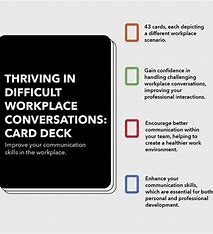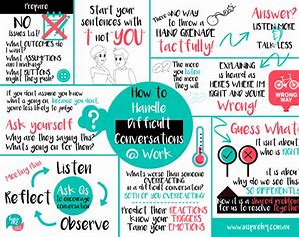Difficult conversations at work aren’t just interruptions to the daily grind — they’re core to developing a thriving, innovative workplace. By tackling these head-on, you create opportunities for growth both for the team and the entire organization.

Dodging these discussions might seem like the easy way out, but letting issues simmer can affect team dynamics in a big way. Unaddressed problems can lead to a buildup of resentment and a breakdown in communication, ultimately impacting morale and productivity.
click here to start your own online business for free Ced0224
Being ready and willing to dive into challenging talks starts with understanding their value. It’s about embracing the discomfort as a doorway to better understanding and improvements. Everyone wins when feedback is given and received constructively.
Key skills like emotional intelligence, patience, and resilience are your best friends here. These will help you approach talks with clarity and confidence, making it less about confrontation and more about conversation. It’s about building bridges, not walls.
Preparation: Setting the Stage for Productive Dialogue
Before jumping into a tough conversation, it’s crucial to know exactly what you’re aiming to achieve. Identify the core issues at hand and clarify your objectives. Are you looking to address a specific problem, clear up a misunderstanding, or encourage feedback? This clarity will guide the conversation in a purposeful direction.

Mental prep is just as important as having the right words ready. Gear yourself up with a positive mindset and a calm demeanor. It’s also worth acknowledging your emotions and biases to prevent them from clouding your judgment during the talk.
Picking the right time and place is more than just setting the scene. It’s about creating an atmosphere conducive to open, honest dialogue. Steering clear of busy periods or high-stress environments can make a world of difference in how the conversation unfolds.
Having a roadmap is a lifesaver. Draft key points you’d like to cover, but stay flexible to adapt as the conversation develops. While it’s good to enter with a plan, the ability to pivot when necessary shows you’re listening and willing to adjust as new insights emerge.
Mastering the Art of Active Listening
Being a good listener isn’t just about nodding along. It’s about truly hearing what the other person is saying, both verbally and non-verbally. During tough conversations, this can be your secret weapon in understanding the root of issues and fostering a sense of openness.
Showing genuine empathy and understanding goes a long way. It’s not just about hearing words but grasping emotions too. Use phrases like “I understand how you feel” or “That sounds challenging”, to demonstrate that you’re engaged and empathetic.
Reacting without escalating the situation is key. Breathe, consider the other person’s perspective, and respond thoughtfully. Instead of interrupting or getting defensive, take a moment to digest what’s being shared before replying.
Remember to check in with the speaker to clarify any points and to ensure that you’re on the same page. Simple affirmations or paraphrasing what’s been said can show that you’re committed to understanding their perspective, paving the way for more constructive exchanges.
Effective Communication Techniques for Difficult Discussions
Crafting your words wisely can change the course of any tough talk. Using ‘I’ statements helps express feelings and intentions without sounding accusatory. Rather than saying, “You never meet deadlines,” try, “I’ve noticed deadlines have been challenging for us to meet on time.” It’s about expressing your perspective without blaming the other person.

Your body language and tone of voice are just as important as your words. A relaxed posture and a calm, steady voice help create a non-threatening space. If your words say one thing but your body screams another, mixed messages can arise, leading to more confusion.
Emotions can run high in tough situations, and keeping them in check is a skill we’ve all gotta work on. Taking deep breaths, pausing before speaking, and staying open-minded can prevent things from spiraling out of control. When emotions get the best of us, it can derail a productive conversation in seconds.
It’s all about being clear yet considerate. Articulate your points clearly and stay on track, but also be prepared to listen and adapt. This mindset fosters a two-way street where both parties feel valued and understood.
Finding Common Ground: Strategies for Solutions
Collaborative problem-solving transforms a difficult conversation into an opportunity for growth. Rather than sticking with stubborn stances, encourage everyone involved to brainstorm ideas and work toward a resolution beneficial for all.
Instead of falling into the blame game, aim for understanding the ‘why’ behind each perspective. Discuss the intentions and concerns openly, making it clear that the aim is to move forward, not to dwell on past missteps. This approach reduces defensiveness and fosters trust.

Creating actionable solutions means putting ideas into action with clear and agreed-upon steps. Work together to outline specific actions each party will take. Make sure all parties leave with a clear understanding of who’s doing what, reducing the risk of confusion or unmet expectations down the line.
A sense of shared ownership in the outcome strengthens team connections and accountability. By jointly developing solutions, everyone walks away invested in the outcome, which boosts commitment and motivation to see it all through.
Post-Conversation Follow-Up: Building A Culture of Continuous Improvement
After a difficult chat, reflection is your best friend for both personal and team development. Spend some time analyzing what went down, identifying what worked well, and figuring out any tweaks for the future. This mindful reflection is key to leveling up your conversation game over time.

Keeping communication channels open is essential even after you’ve wrapped things up. It shows that the lines are still open for feedback or any adjustments that might be necessary. This openness encourages a culture where tough talks become less intimidating and more normalized.
Stay accountable for what was agreed upon. Keeping tabs on progress helps ensure commitments are met, and necessary adjustments are made proactively. Letting things slide can erode trust and undo all the hard work you’ve put in.
Cultivating an environment of continuous improvement takes dedication, but it’s totally worth it. By committing to consistently improving the way you address and resolve conflicts, you’re not just solving problems but also enhancing team dynamics and overall workplace morale.
